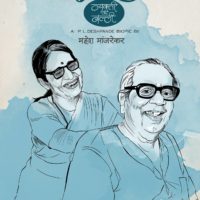

“I grew up in the era of Gandhi and Nehru. Purushottam Laxman Deshpande with one of his grand-nephews. He would have never imagined that his son would waste reams of paper in the name of writing.” Pu La went on to work as a school teacher and college lecturer, and even as a television journalist. In an account of his childhood, he wrote, “My father worked as a clerk with a paper trader. Manjrekar has maintained that this book was one of the key inspirations behind his film.īorn on Novemin a small chawl in South Bombay, then a relatively sleepy place, Pu La took to singing, writing and acting from his school days. In her autobiographical account Aahe Manohar Tari (Though Everything Seems Beautiful, 1990), Sunita too wrote about a lesser-known, human side of of Pu La with all his flaws and weaknesses. Doesn’t that scene show the human side of him, a different shade of his personality?”

There is a scene where Pu La and Sunitabai decide not to have a child. There is one scene where he has been shown drinking socially. The objection that he has been portrayed as a drunkard is rubbish. People have an option not to watch it but you do not have the option to tell me how to do it. “I have made a film that I wanted to make, and not the film which many of the critics have in their heads.

Manjrekar has defended his film, arguing that he was reaching for a more human portrayal of the icon. Subsequently, family members of Joshi and Barodekar, relatives of Pu La and Sunitabai came out in protest. A piece carried in Loksatta in January raised questions on the portrayal of Pu La as well as his contemporaries like classical vocalists Bhimsen Joshi, Vasantrao Deshpande and Hirabai Barodekar. His satire was never a mockery of people and situations around him, which the film seems to be showing,” says writer and educator Mangala Godbole, biographer of both Pu La and Sunitabai. “There is a difference between an artist taking creative liberty and distorting the facts. Some of the jokes that Pu La is seen cracking in the film, are, according to some, far from the kind of humour he was known for. Critics of the Mahesh Manjrekar film have been riled by what they call are factual errors, as well as a depiction of Pu La “in a bad light”, especially in scenes that showed him smoking and drinking. As Maharashtra celebrates Pu La’s birth centenary this year, a two-part biopic on him, Bhai: Vyakti ki Valli, has sparked a fierce debate. He was a writer, playwright, humorist, scriptwriter, composer, singer, actor and also a socially vocal and active philanthropist - and this list is still insufficient to describe who he was. There is arguably no other person in Marathi arts and culture, who is more widely adored and respected than Purushottam Laxman Deshpande or Pu La to his loved ones.


 0 kommentar(er)
0 kommentar(er)
